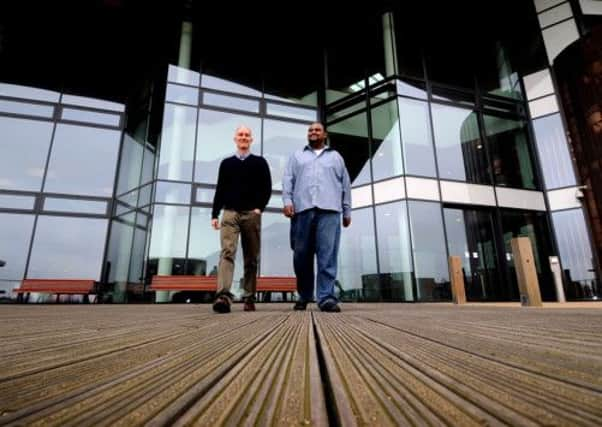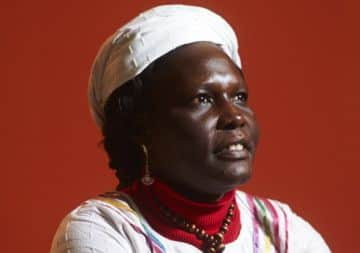‘I don’t have to fear the police here... it’s still strange they don’t have guns’


IN the few months that Nagi Musa has lived in York, he has not lost the learned panicky response to the odd creaking noise in the night, and he does still find himself scanning any group of people in case there’s someone who looks like a threat. He tends to position himself where he can see the nearest exit, too.
Other human rights activists working to bring about peace and social justice in troubled lands would no doubt recognise his reactions. After all, some of their ilk have paid the ultimate price for sticking their head above the parapet.
Advertisement
Hide AdAdvertisement
Hide AdOften, like Nagi, they carry out their work in the certain knowledge that they are spied upon and can, at any moment, be dragged off to jail with little or no excuse. Intimidation and threats can be an everyday occurrence.


However, in his short time in Yorkshire, Nagi says he has started to view British policemen without suspicion. “I realise now that I don’t have to be frightened. It’s still strange to see that they don’t carry guns, though.”
Nagi is one of the latest of 36 human rights activists who have travelled to York from many countries as part of a unique programme called The Protective Fellowship Scheme for Human Rights Defenders at Risk. These defenders, marked men and women whose work is seen as subversive by the ruling regime in their country, are nominated by human rights groups working in their homeland and invited to come to Yorkshire for six months for a period of study in an environment that is a haven away from the stress of their difficult work.
The Fellowship Scheme was won by York after UK universities were asked to apply to administer it. Philanthropic donations (see side panel) set up a £1m fund to provide £10,000 for each human rights defender, covering visa, flights, accommodation, living expenses and a training budget for a period of up to six months.
Advertisement
Hide AdAdvertisement
Hide AdThe fellowship offers both life-changing opportunities and respite to people who may be continually under threat of intimidation or violence. York went on to create a specialist human rights study centre with a staff of six around the Fellowship.
Nagi, 25, is Sudanese but spent much of his childhood in Jordan where his parents were university lecturers. He studied in a radical Muslim school, where he learned that discussion of social equality and politics – in its widest or narrowest sense – were frowned upon.
However, he says children were “brainwashed” by photos of decapitated young Muslim soldiers in Chechnya and dead and maimed Palestinians, calculated to engender hatred for Israel. This propaganda fuelled early thoughts about justice and peace.
The family returned to Sudan, where Nagi went to high school and joined anti-government political groups as well as publishing articles about the need to bring the warring tribes of Sudan together.
Advertisement
Hide AdAdvertisement
Hide AdHe studied medicine, was elected as student representative and organised student debates to discuss cultural issues and how to bring about social change in the civil war-ravaged country. But government spies were everywhere, and no kind of political discussion was allowed unless it was in favour of the ruling party. Student gatherings were broken up by soldiers using rocks and tear gas.
“Actually I am not a supporter of a particular political party,” says Nagi. “I have learned about all the different tribes of my country, and its cultural richness. I would like everyone to accept everyone else and live in harmony, while also improving the economy and getting rid of corruption and fear.”
Arrested by gun-wielding security forces during a peaceful public meeting, Nagi was handed to the police and subjected to various humiliations and beatings. “This just made me believe even more in what I was doing.”
Things were getting too hot for him where he was, so he moved closer to his family, to a university not far from the capital, Khartoum. His family asked him to stay away from politics and lead a quieter life. “But I found that impossible,” he says. “Working to make like more equal and just is part of who I am.”
Advertisement
Hide AdAdvertisement
Hide AdIn 2009 he and two friends started Girifna (meaning “disgusted” in Arabic), a grassroots movement working for non-violent direct action for change. It grew very quickly and Nagi and colleagues were often given donations in the street to continue their work. They used the internet to spread the movement, and it grew rapidly.
In 2010 he started a youth forum across Sudan and South Sudan. “Unfortunately the Sudanese government kept rupturing social peace and tearing the country apart by supporting and arming some tribes against others. Tribes of Arab descent are seen to be superior to those of African ancestry. I hated this discrimination and racism.” Nagi says the partition of Sudan has changed little.
Rather than working via political lines, Nagi sees the route to change through the spreading of understanding between his country’s many ethnic groups. For several years his movements have been watched, he has been thrown into to jail several times, and on one occasion kept in custody for 16 days, being refused visits either his family or a lawyer. In some parts of the country student activists have been tortured and killed for their political activities.
For a time things got too uncomfortable for Nagi at home, and he continued to organise from outside of Sudan. He was nominated for a Fellowship at York by the charity Human Rights Watch.
Advertisement
Hide AdAdvertisement
Hide Ad“I’m using my time here to develop my knowledge and skills in peace-building. It has been so useful, too, to meet people working for human rights in other countries and hear about their struggles and their methods. Eventually I want to set up youth camps to promote understanding among young people of different ethnic backgrounds in Sudan.”
Karak Denyok, a recent recipient of a Protective Fellowship at York, had overcome intimidation and many threats to help more than 12,000 women to escape poverty in her homeland of South Sudan. She set up two projects based around commercial farms, where women could gain basic agricultural knowledge enabling them to feed their families and earn money.
Many of the women Karak helps are refugees or victims of domestic violence. The projects also teach business and literacy skills to overcome a lack of basic education.
As a child Karak had witnessed her family losing their farm when they fled ethnic violence in South Sudan. This informed her desire to use agriculture to cultivate financial independence for women in a culture where domestic violence and prejudice are rife. Recently finishing her six months at York. she says she used her time there to learn about human rights legislation and how it can help her work.
Advertisement
Hide AdAdvertisement
Hide Ad“The main focus of my work in South Sudan has been women,” she says. “But now I want to extend my work with children, many of whom live on the streets. I want to create a drop-in centre, maybe with a school and a health clinic. We need to create a family for these children.”
How does the university benefit from this fellowship? “We believe that human rights defenders are key agents in creating more socially just societies around the world, and they deserve our support,” says Professor Paul Gready, director of the Centre for Applied Human Rights at York University, where fellowship recipients are based. “We also learn a great deal from the defenders who come to us. It’s a two-way thing.
“In many countries human rights defenders can face imprisonment without charge, torture and threats of death to themselves and their families. Their outspokenness may also limit their educational and employment opportunities.
“We provide a period of respite from an intensely challenging environment and access to resources, education, personal development and training. The programme is tailor-made, so they get what they need to support and enhance their work afterwards.”
Advertisement
Hide AdAdvertisement
Hide AdFurther information: www.york.ac.uk/cahr or email [email protected] 01904 325830.
A Unique Fellowship
Human rights workers are nominated for the Protective Fellowship Scheme for Human Rights Defenders At Risk by organisations such as Amnesty International and Human Rights Watch, who have witnessed the nominees’ work on the ground. The scheme is funded by grants from bodies that include the Sigrid Rausing Trust, the Alan and Babette Sainsbury Charitable Fund and the Open Society Institute, backed by support from York University itself. The programme has been expanded with a new 10-week online course - Working Safely: Managing Risk and Strengthening Protection, which provides practical guidance for human rights workers in the field.